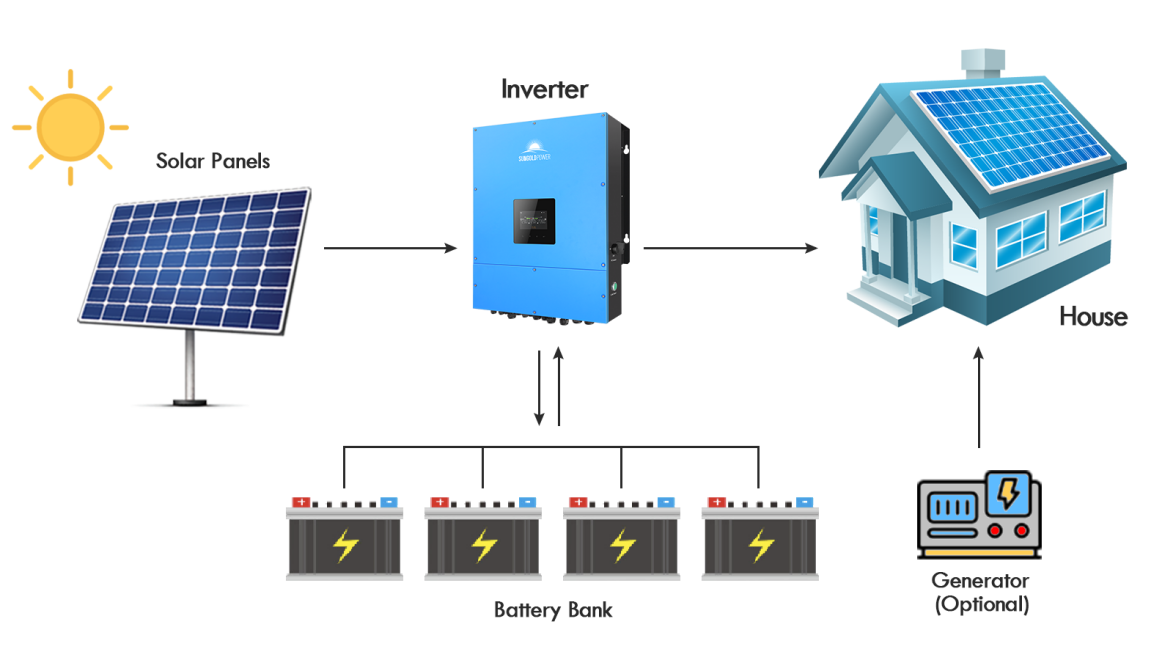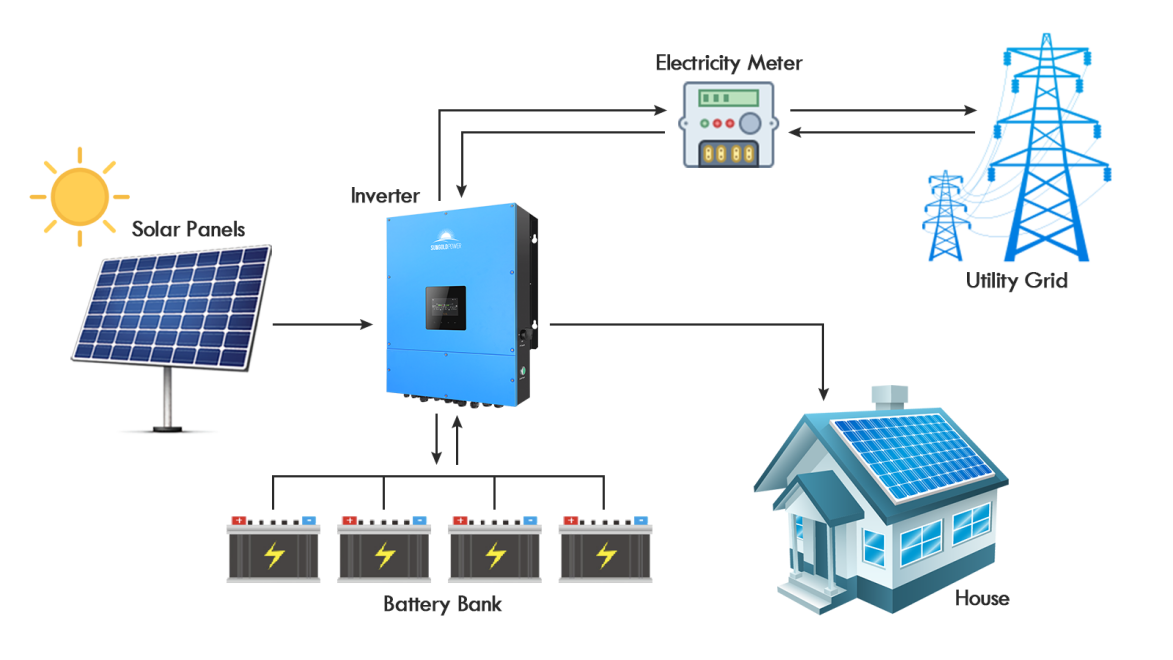On-grid, Off-grid and Hybrid: Which is better for you?

Solar power is the fastest growing and most dynamic renewable energy utilization technology in recent years. With the growing popularity of home PV power plants, many people are troubled by the question: grid-connected or off-grid when installing rooftop PV power plants?
There are three types of solar systems: on-grid, off-grid and hybrid solar system. Each type of system has a unique setup that affects what equipment is used, the complexity of the installation, and most critically, your potential costs and savings.
What is the difference between on-grid, off-grid and hybrid? Which system is the best for your situation?
On-grid Solar System

On-grid solar system is one that must be connected to the utility grid. Grid-tied, Grid-connected, utility interaction, grid-parallel and grid-feedback are all terms used to describe the same conceptIt connects the solar power, the home grid, and the utility grid together. It must rely on utility grid to operate and consists primarily of solar panels and an inverter.
The direct current generated by the solar panels is sent to an grid tied inverter, which converts the electricity into alternating current. When the amount of solar power generated exceeds the amount of electricity used by household appliances, the excess electricity is delivered to the utility grid. Systems such as Net Metering and Feed-in Tariff which are offered by some system operators, can offset a customers electricity usage costs. The excess power generated is sent to the utility's grid and the consumer is compensated. Similarly, when the system does not generate enough power, the consumer can draw power from the grid and pay for the units used. When the amount of solar power generated cannot meet the use of household appliances, it is automatically replenished from the utility grid. However, there is a threshold that needs to be met in order to meet the relevant regulations and policies of the local grid, otherwise it is not possible to provide grid connection.
On-grid solar system is the only type of solar system that does not require batteries to operate. This makes On-grid solar system cheaper and simpler to install, and means less maintenance is required. You can use the utility grid as a virtual battery that requires no maintenance or replacement, and is much more efficient.
Off-grid Solar System

Off-grid solar system, also known as stand-alone solar system, is a characteristic of buildings and a lifestyle designed in an independent manner without reliance on one or more public utilities. It is mainly composed of solar panels, storage batteries, inverters and other components. In short, an off-grid inverter draws DC power from a battery source that is charged using a solar array. Therefore, the primary advantage is that it can operate even if the grid fails.
The solar panel generates electricity directly into the battery and stores it. When it is necessary to supply power to household appliances, the DC power in the battery can be converted into AC power by the solar inverter. Off-grid solar system is not restricted by geography and can be installed wherever there is sunlight. Although off-grid systems are self-sufficient, they involve higher costs. This is because consumers must purchase battery packs, solar panels, inverters and other solar pack accessories. These panels generate and store electricity during the day and use it at night. Therefore, it is ideal for remote areas without grid, isolated islands, fishing boats, outdoor breeding bases, etc. It can also be used as emergency power generation equipment in areas with frequent power outages.
The benefit of off-grid solar systems is that they can be installed in locations that are not connected to the utility grid. In some remote areas, off-grid solar systems may be cheaper than extending power lines. To live off the grid and be self-sufficient is form of security.. Power failures in the utility grid do not affect off-grid solar systems.
On the contrary, the battery can only store a certain amount of energy. On the contrary, the battery can only store a certain amount of energy. You should install a backup generator to prepare for cloudy days.
Optional generator is designed to prepare for several consecutive days without the sun shining. In most cases, installing a diesel-fueled backup generator is a better option, and generators can run on propane, oil, gasoline and many other fuel types. Optional generators usually output AC power, which can be used directly through an inverter or converted to DC power for battery storage.
Hybrid Solar System

Hybrid solar system combine the benefits of both on-grid and off-grid solar system. This system can be described as off-grid solar with utility backup power, or as grid-tied solar with additional battery storage.
The system consists of solar panels, hybrid solar inverter, batteries, load, etc. The PV array converts solar energy into electricity when there is sunlight, and supplies power to the load through the inverter and charges the battery at the same time; when there is no sunlight, the battery supplies power to the inverter and then supplies power to the AC load.
The system has an additional battery compared to the grid-tied solar system. The inverter can be switched to off-grid mode to supply power to the load when the grid is down.
Hybrid solar system is less costly than off-grid solar systems. You don't really need a backup generator, and the capacity of your battery bank can be scaled down. If your batteries go dead at night, you can simply buy off-peak power from the power company. This will be much cheaper than operating a generator.
Hybrid solar systems has opened up many interesting innovations. It allows homeowners to take advantage of utility electricity price changes throughout the day. Solar panels output the most power exactly at noon - shortly before electricity prices peak. Your home and electric car can be set to consume power during off-peak hours (or from your solar panels). So you can temporarily store the excess electricity your solar panels produce in your batteries and put it into the utility grid when you're paying the most for each kilowatt hour.
Final Thoughts
Whether or not you choose to remain tied to the grid or rely solely on solar power depends on your budget and energy consumption. No matter what system you choose, the inverter is an integral part of it.
Our SunGoldPower is a renewable energy company that was founded by a famous engineer in 2010. Our LFP, LFPV and BluePower series are top-grade inverters to fully support the energy conversion in all kinds of systems. We provide professional technical support to fast-forward the installation process and to give you .
To know more about us and our products in detail please visit our Homepage or write to us at sales@sungoldpower.com!
Leave a comment
Comments will be approved before showing up.




